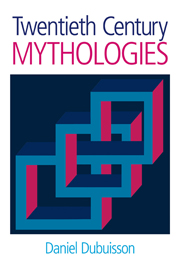Book contents
- Frontmatter
- Epigraph
- Contents
- Foreword by Professor Robert A. Segal
- Preface
- Abbreviations
- Introduction: History and comparative epistemology
- Part I Georges Dumézil, or Society
- Part II Claude Lévi-Strauss, or the Mind
- Part III Mircea Eliade, or the Sacred
- 12 Fascism and mysticism
- 13 Primitive ontology
- 14 The eternal return of anti-Semitism
- 15 The neo-paganism of homo religiosus
- 16 Metaphysics and politics: Eliade and Heidegger
- Addendum III Esotericism and fascism
- Addendum IV The reconstruction of prehistoric religions
- Addendum V The Eliadean conception of symbolism
- Addendum VI Forgetting the Shoah
- Conclusion: Modern theories of myth and the history of Western thought
- Bibliography
- Index
Addendum IV - The reconstruction of prehistoric religions
from Part III - Mircea Eliade, or the Sacred
- Frontmatter
- Epigraph
- Contents
- Foreword by Professor Robert A. Segal
- Preface
- Abbreviations
- Introduction: History and comparative epistemology
- Part I Georges Dumézil, or Society
- Part II Claude Lévi-Strauss, or the Mind
- Part III Mircea Eliade, or the Sacred
- 12 Fascism and mysticism
- 13 Primitive ontology
- 14 The eternal return of anti-Semitism
- 15 The neo-paganism of homo religiosus
- 16 Metaphysics and politics: Eliade and Heidegger
- Addendum III Esotericism and fascism
- Addendum IV The reconstruction of prehistoric religions
- Addendum V The Eliadean conception of symbolism
- Addendum VI Forgetting the Shoah
- Conclusion: Modern theories of myth and the history of Western thought
- Bibliography
- Index
Summary
Considered for a long time, and by many, to be one of the major contributions of our time in the field of the history of religions, the work of Mircea Eliade has been subjected from the end of the 1980s to a series of analyses both pertinent and implacable, which have demonstrated that it would be best to consider this work as very clever pseudo-scientific fiction. With this in mind, the method that merged progressively over these years, witnessing the disintegration of Eliade's prestige, can be reduced to its two very simple principles:
(a) Refusal of the metaphysical stance adopted by Eliade, which he obstinately tries to insert into the foundation of any research in the history of religions. This stance involves considering sanctity as “an element in the structure of the conscience” and the Sacred itself as an absolute reality whose manifestations or hierophanies reveal its transcendence and thus radical “otherness” (SP, 116–18). Such choices distort the anthropological and historical bent of the history of religions and threaten to mire it in insoluble theological quarrel.
(b) The second principle brought out by this contemporary critique arises from a prosaic fact. In spite of their propensity to assert the discovery of transhistoric structures and meanings, the works of Eliade present hardly any aspect whose origin and place could not be rather precisely situated in history.
- Type
- Chapter
- Information
- Twentieth Century Mythologies , pp. 259 - 266Publisher: Acumen PublishingPrint publication year: 2006



